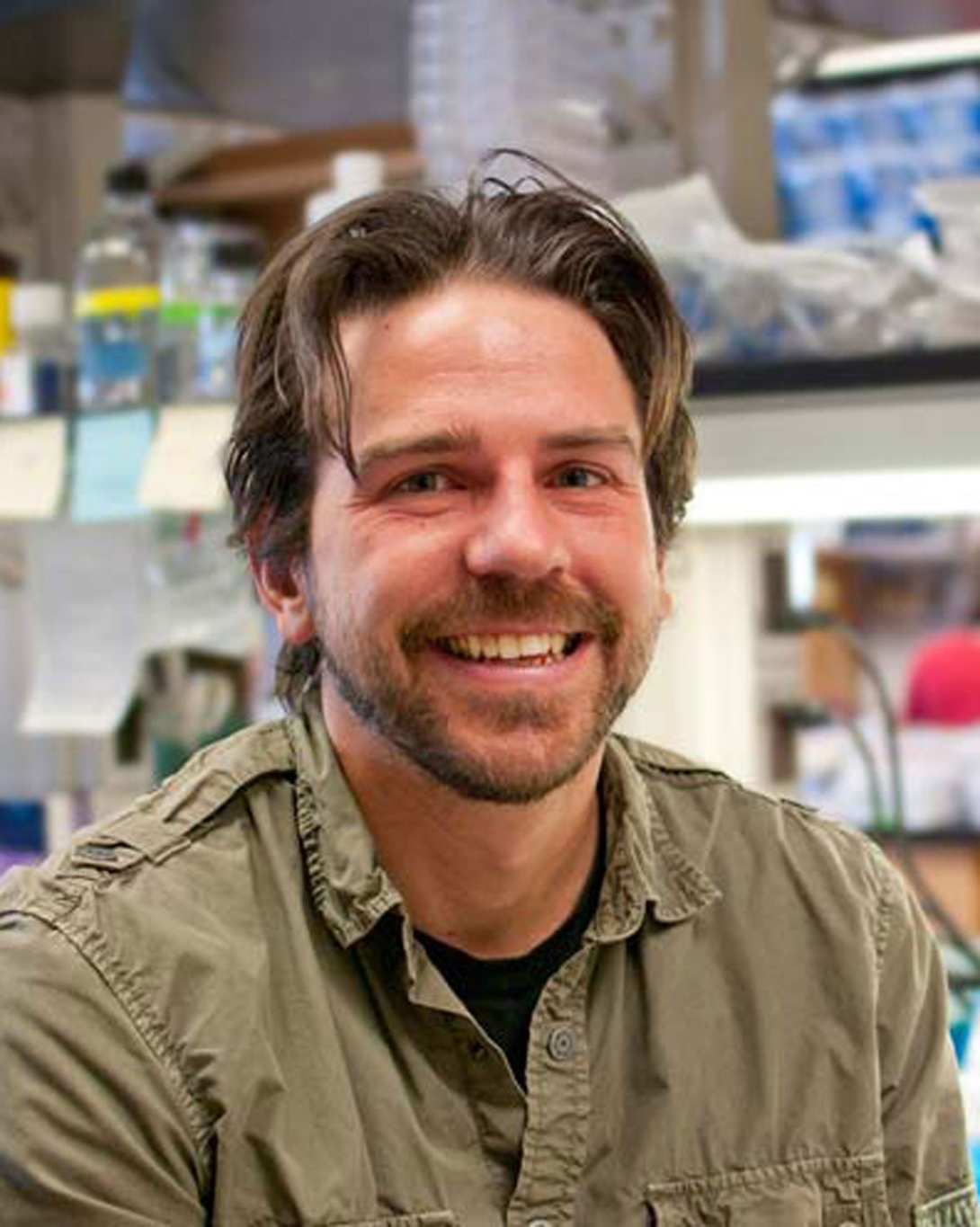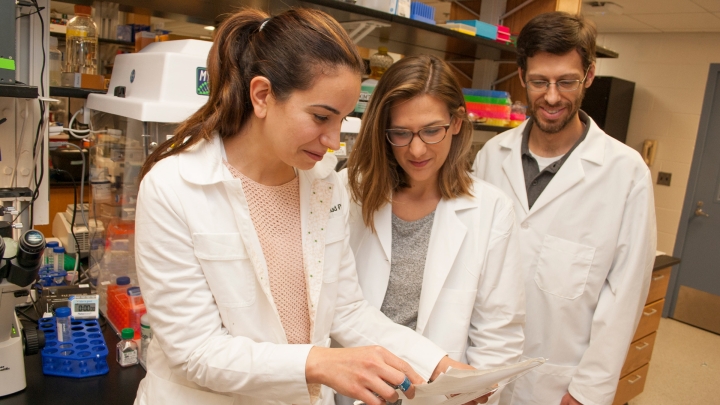
The PhD Program in Genetics & Genomics trains students to understand the fundamental mechanisms of genetics and extend their knowledge of basic biology and human disease through cutting-edge research.
Our graduate program emphasizes student development in key areas including developing and pursuing scientific questions, the application of molecular, animal-model, genome-wide, and bioinformatics approaches, critical analysis of the scientific literature, and scientific communication.
Students apply to the Ph.D. program through the Program in Biomedical Sciences (PIBS) except for students pursuing combined M.D. and Ph.D. degrees (Medical Scientist Training Program link). After completion of required coursework, the doctoral dissertation is generally completed within 5 years.
Successful applications will list the Genetics & Genomics Program as their 1st choice and discuss the following in your Academic Statement of Purpose:
- A description of the area of genetics research that you are interested in and your motivation for wanting to pursue this area of research.
- Selection of the Top (3) laboratories in the Department of Human Genetics that you would be interested in training in, and a few reasons why you selected these laboratories.
The PhD Program in Human Genetics offers a structured yet flexible curriculum. In the first year, students take core courses in genetics and engage in lab rotations. The second year focuses on research and scientific communication, with opportunities to choose electives in specialized areas like bioinformatics, biostatistics, and cancer biology.
Fall Term
- HUMGEN 545 - Molecular, Cellular, and Organismal Genetics
- HUMGEN 821 – Student Seminar
- PIBS 503 – Lab Survival Skills and Ethics
- PIBS 600 – Laboratory Rotation
- PIBS 800 – PIBS Seminar
Winter Term
- HUMGEN 546 – Genetics in Human Biology and Disease
- HUMGEN 803 – Research Topics
- HUMGEN 822 – Student Seminar
- PIBS 600 – Laboratory Rotation
- Major elective course(s) from other departments (3-6 credits)
Spring Term
- PIBS Laboratory Rotation
Fall Term
- HUMGEN 821 – Student Seminar
- PHARMACOL 502 - Introduction to Scientific Communication
- HUMGEN 990 – Research (up to 8 credits)
- Major course(s) from other departments (3-6 credits)
Winter Term
- HUMGEN 822 – Student Seminar
- HUMGEN 995 – Candidacy Research (8 credits0
- Major elective course(s) from other departments (3-6 credits)
Examples of Human Genetics electives and recommended courses from other departments. Please note that not all courses are offered every year
Fall Term
- BIOINF 527 Introduction to BIOINFormatics and Computational Biology
- BIOLCHEM 550 Macromolecular Structure & Function
- BIOLCHEM 591 Special Topics in Signal Transduction
- BIOSTAT 521 Applied BIOSTATistics
- BIOSTAT 601 Probability & Distribution Theory
- BIOSTAT 666 Statistical Models & Numerical Methods in Human Genetics
- CANCBIO 553 Cancer Biology
- CDB 530 Cell Biology
- CDB 581 Developmental Genetics
- MICRBIOL 619 Special Topics in Microbiology & Immunology
- MICRBIOL 640 Molecular & Cellular Immunology
- STATS 425 Introduction to Probability
- STATS 426 Introduction to Theoretical Statistics
- STATS 500 Applied Statistics I
Winter Term
- HUMGEN 665 Statistical Population Genetics (odd years)
- BIOLCHEM 576 Signal Transduction
- BIOLCHEM 640 Regulatory RNA & Control of Gene Regulation
- BIOLCHEM 650 Mechanisms of Eukaryotic Gene Expression
- BIOSTAT 602 Biostatistical Inference
- CANCBIO 554 Cancer Pathogenesis & Treatment
- CDB 582 Organogenesis: Stem Cells to Regenerative Biology
- EPID 516 Genomics in Epidemiology
- MICROBIOL 504 Cellular Biotechnology
- MICROBIOL 607 MICROBIOLbial Pathogenesis
- MICRBIOL 615 Viral Pathogenesis I
- MICROBIOL 619 Special Topics in MICROBIOLbiology & Immunology
- PATH 581 Tissue, Cellular & Molecular Disease
- PHARMACOL 502 Introduction to Scientific Communications
- PHYSIOL 555 Integrative Genomics
- STATS 400 Applied Statistical Methods
- STATS 425 Introduction to Probability
- STATS 426 Introduction to Theoretical Statistics
- STATS 500 Applied Statistics I
Students are fully funded through their training with a stipend, benefits, and paid tuition and fees. Application fee waivers are available.
All students in good standing will be provided with a monthly stipend, comprehensive health care coverage, and coverage of tuition and fees. For the first year, PIBS will cover all expenses. In year two, the student will be supported by a combination of individual fellowships, pre-doctoral training grant funds, institutional funds, and research grants.
Learn more about the Genome Sciences Traning Grant
Our PhD students range from those just beginning their journey and exploring potential research mentors to advanced students who are in the final stages of completing their doctoral dissertations.
Established in 1979, the U-M Medical Scientist Training Program (MSTP) is tailored to meet the educational needs, unique talents, and dedication of students who seek a combined MD-PhD degree with the goal of establishing a career in academic medicine. Our graduates represent the best of what the U-M Medical School contributes to the advancement of science and medicine.
MSTP Curriculum
Medical Scientist Training Program (MSTP) students receive 18 credit hours for medical school coursework. This typically includes training in biochemistry and cell biology to satisfy course requirements in these areas. MSTP students are required to take core coursework in the Department of Human Genetics including HUMGEN 545, HUMGEN 546, PIBS503, HUMGEN 803, and 2 semesters of the student seminar course, HUMGEN 821/822. Three elective credits are waived for MSTP students; thus, they need to select a minimum of three elective credits of graduate coursework to fulfill the requirement for the Ph.D. degree.
MSTP students entering the Genetics and Genomics Graduate Program after their M2 year will have completed two lab rotations—with a possible third—during the summers and will take their preliminary exam after one year in the PhD program, on the same schedule as the PhD students.
Current areas of research include gene regulation and replication, genome organization, developmental genetics, complex trait analysis, population and quantitative genetics, disease gene identification, and molecular mechanisms of disease.

Associate Chair, Department of Human Genetics
Program Director, Human Genetics
Associate Professor of Obstetrics and Gynecology
Associate Professor of Urology

Our interdisciplinary research in human genetics provides diverse opportunities to explore the genetic foundations of health and disease.

We create a supportive environment that enhances creativity, collaboration, productivity and personal satisfaction.

We find a new reason to love Ann Arbor nearly every day — year-round outdoor activities, cultural experiences, a growing food scene, and a welcoming, family-friendly atmosphere are just a few that come to mind.